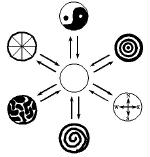|
There is an experience the author
had as an undergraduate physic major that significantly impacted his
life. In particular, it significantly impacted how he managed
employees and organizations.
A physicist is devoted to finding a way to understand and/or predict
the operations of physical Creation. Given a set of conditions, the
physicist looks to understand the principles governing the condition
such that they can predict the outcome. If they cannot fully
understand all the principles, they look to find a way to
nevertheless predict the outcome. Quantum mechanics is good example
of this statement. The mathematics and theory of quantum mechanics
as applied does a good job of predicting the outcome of many
situations at the atomic level. However, whether or not any
physicist truly understands quantum mechanics and the paradoxes it
seems to raise is another question. Nevertheless, the physicist is
focused on the predictive qualities of the theory they use.
Contribution of
Niels Bohr and
Albert Einstein both provided some insights into this view of
physicists and their contributions provide a similar influence on
the Releasing Your Unlimited Creativity material.
As a “physicist in training” the author frequently remembers a
discussion he held with his undergraduate Physics Department
Chairman, Dr. Beiduk In discussion about solving physical problems
and failure to get an answer that corresponded to the natural order
of things, Dr Beiduk made the following statement, “The mathematics
doesn’t lie, it is in your postulates you find your problems.” That
to which he referred was that there was a cause effect relationship
in events in physics. All the mathematics does is mimic or symbolize
that cause effect relationship and how that relationship unfolds in
a given situation. If you have choose the correct mathematical
descriptions of the situation or the correct mathematical model, you
should have no problem predicting the outcome. If you don’t predict
the outcome accurately, the model you choose is wrong, not the
mathematics. You can’t say the mathematics is wrong. Your
assumptions about the situation is wrong. Quite simply there is
something you failed to observe and failed to properly consider
about the situation.
As a physics student, the author understood the truth of the
statement as it applied to trying to understanding and model
physical Creation. However, as the author grew older and worked
outside the world of physics, he began to observe the truth of this
statement in other areas of life, especially in organizations. He
began to understand we act and respond to the world based on the
assumptions we hold about the situation we face. Although we may not
use mathematical models to predict the outcome of situations, we
often try to predict and force the outcome of a situation. Although
we many not consciously think it, we nevertheless think, “If I act
this way, this will happen. If I act that way, that will happen.” In
essence what we are trying to do is predict the outcome of our
choices because we think we know how a situation will unfold.
Sometimes we are correct, other times we are in error. Nevertheless
we are trying to predict the outcome.
What the author slowly came to observe is that we are acting based
on assumptions we have made about ourselves, the situation at hand
and how we think the world works. We call them beliefs and
understanding. In reality, they are simply assumptions we have made
as a result of the past experiences we have had. Either from
experiences we have personally had or from what we have learned from
others.
His first real non physics application of this understanding
about the assumptions we make was as the Company Commander of the
Naval Reserve Officer Training Corps Band, otherwise known as “Band
Company,” his senior year as an undergraduate. The experience with
Band Company coupled with looking into the assumptions we make about
the situation we face, influenced his entire outlook and philosophy
of management throughout his career. Looking into the nature of our
assumptions ultimately lead him to explore the nature of creativity.
And, as the cliche states, ‘The rest is history.”
Index of topics related to the origins of the Releasing Your Unlimited
Creativity Technology and applications
The pieces of the puzzle
Origins and Occasions
for the Releasing Your Unlimited Creativity Technology and it
applications
Index of origins and occasion topics
Related topics
The Password
Protected Area provides access to all
currently posted
(click for current loading) Releasing Your Unlimited Creativity
related discussion files and applications.
Top |
